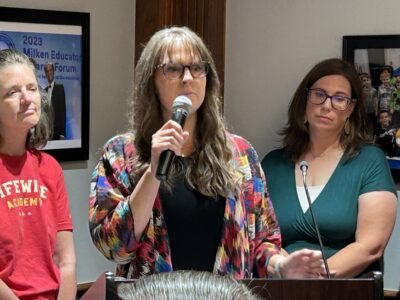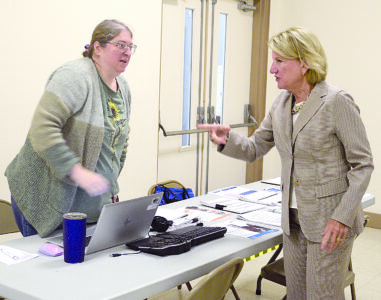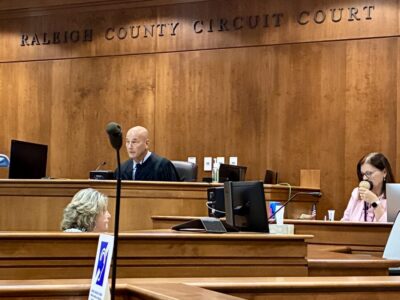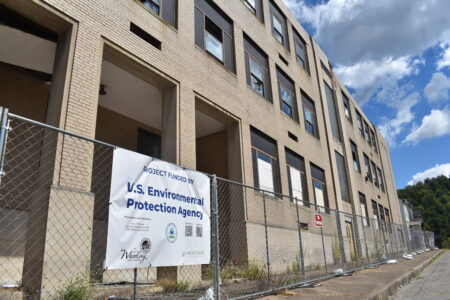Ohio County School Board Denies Request To Transport Students for Religious Classes During Lunchtime

photo by: Joselyn King
Wheeling Middle School teacher Trisha Cronin speaks to Ohio County Board of Education members Monday about a request for students to leave school during the day to participate in religious classes.
WHEELING — The Ohio County Board of Education on Monday rejected a request from a religious group asking for permission to transport students off school property during school hours so they can attend religious classes offered by the organization.
Board members voted 3-2 against the school district developing a policy to permit the students to leave at lunchtime to attend the classes.
Voting against the measure were board President David Croft and members Anne Hercules and Andy Garber. Voting in favor were Molly Aderholt and Bernie Albertini.
Wheeling Middle School teacher Trisha Cronin addressed the board before their vote, outlining the purpose and virtues of Lifewise. She noted the program is already working well in Belmont County school districts. Those working with the students also spoke and said the program has positive effects on students previously showing behavior and learning issues in the classroom. They also said academics overall improved among students who participated.
Rabbi Joshua Lief of Temple Shalom and Bishop Darrell Cummings of Bethlehem Apostolic Temple also provided their thoughts on the topic, with Lief opposed to permitting children to leave their classmates and Cummings urging the board to investigate the matter and not move quickly to decide.
A capacity crowd largely inspired by posts on social media turned out for the discussion. Many signed up to speak on the issue during the delegations time on the meeting agenda, but the delegation’s time was near the end of the meeting after the vote had taken place.
Croft said the primary responsibility of the school district is to provide a “sound public education for all students.” He added that the schools only have children 21% of the time each week to accomplish this goal, while there is the other 79% of time during which parents and churches can provide them religious teaching without disrupting academics.
“I don’t doubt there are benefits that Lifewise offers to kids that participate in the program,” he said. “But there is a balancing we have to try to find, and it is not always easy ….
“Our duty as a board requires that we safeguard instructional time and maintain a neutral environment where every child, regardless of background or faith, receives equal access to learning.”
He suggested allowing students to leave school for religious classes “would disrupt the continuity of the learning day.”
Aderholt said it wasn’t the board’s role to debate whether the teachings of Lifewise “were good or bad,” but whether it was in the best interest of the student to be released to attend religious classes.
She added that she has always sided with parents’ rights and those of the student, as well as the rulings of the U.S. Supreme Court affirming parent and student rights.
“I don’t think we can just ignore those,” Aderholt said. “If we can keep kids in public from using the HOPE Scholarship and attending religious school, great. If we could improve our attendance, that would be great.
“My position is why don’t we give it a try … do a trial run and see if it works.”
Hercules was skeptical that young children would retain the religious teachings from Lifewise, and she suggested the lunch period isn’t long enough “to teach them what they need to know.”
She pointed to successful afterschool programs locally that assist students with homework, feed them then provide a religious message.
“Do we need this? Yes, we do,” Hercules said. “But I don’t feel that during school time is the time to do this. It is very disruptive.
“I just feel they need a longer period. How long is a lunch period? They are going to take five to 10 minutes to get there, then five to 10 minutes to get back. And they say they are going to feed them while they are there. How much are you going to teach them during that time?”
Garber added that the main responsibility of the school district is academics.
“I am opposed to having kids leave in the middle of the day. Our focus should be on academia and teaching those kids to hit the books,” he said.
Garber added he would like to see the school district “continue doing what we are doing,” and he stressed the importance of afterschool programs.
Albertini said religious schools “are great if you can afford them,” and that parents and their children who cannot afford tuition at a religious school would benefit from Lifewise.
“We’re their only hope,” he continued. “I agree academics are important, but we are also trying to make well-rounded students who will be well-rounded citizens when they grow up.
“For that reason, I’m voting ‘yes’ for this — for those kids whose parents want them to have this kind of education and can’t afford to send them to another school.”
Superintendent Kim Miller was asked to provide her opinion on the issue.
“We certainly respect parents’ rights,” she said. “But my main job is academic accountability and the health and well-being of our students when they are in school.”
Miller added that she was concerned about the safety of students leaving school property at lunch time. She added that she couldn’t endorse any child missing academic instruction or the social interaction that takes place during lunch.
Lief said school life is already a challenge for minority children, and it could be made more so if the other children leave to attend programs that differ from their religion.
“It is going to be difficult for the minority child, and I worry about anything that is going to add more divisiveness to that classroom … ,” he said. “At the minimum, there is going to be a division between those who left and those who stayed.”
He called religious education not just necessary but “critical,” but he added that it doesn’t have a place in public schools.
Cummings encouraged the board to investigate the issue further before acting.
“It is better to move slow in the right direction than fast in the wrong direction,” he told them.
The board is next scheduled to meet at 6 p.m. Sept. 8 in the board office, 2203 National Road, Wheeling.






